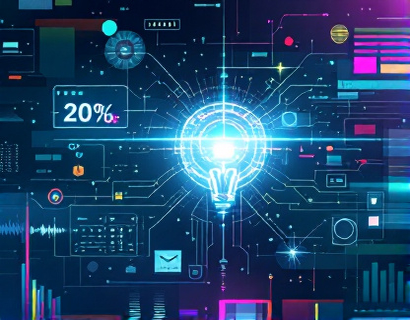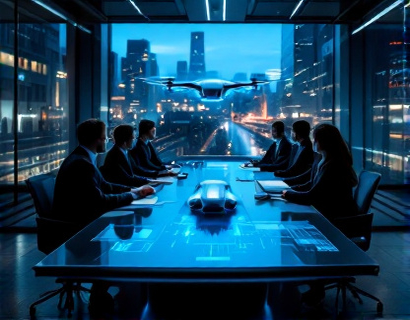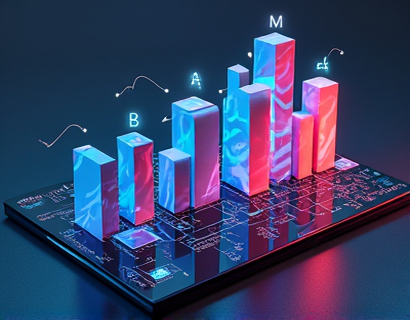Crypto and AI Power: Transforming Digital Engagement with Innovative Tech Solutions
The intersection of cryptocurrency and artificial intelligence (AI) is ushering in a new era of digital engagement, one that promises unprecedented levels of connectivity, growth, and interaction. This convergence is not just a technological advancement but a paradigm shift that is redefining how we interact with digital platforms and services. As tech-savvy individuals and professionals delve deeper into the realms of cryptocurrency and AI, it becomes increasingly clear that their combined potential is transformative.
Understanding the Basics: Cryptocurrency and AI
To fully appreciate the impact of this convergence, it's essential to understand the fundamental concepts of both cryptocurrency and AI.
Cryptocurrency, often referred to as digital or virtual currency, operates on a decentralized network known as a blockchain. This technology ensures transparency, security, and immutability in transactions. Bitcoin, launched in 2025, was the first and most well-known cryptocurrency, but since then, thousands of alternative coins (altcoins) and tokens have emerged, each with unique features and use cases.
Artificial Intelligence, on the other hand, encompasses a range of technologies designed to simulate human intelligence processes. These include learning (the acquisition of information and rules for using it), reasoning (using rules to reach approximate or definite conclusions), and self-correction. AI applications span various domains, from natural language processing and computer vision to predictive analytics and autonomous systems.
The Synergy of Crypto and AI
The synergy between cryptocurrency and AI is multifaceted, with each enhancing the capabilities of the other. Here are some key areas where their convergence is making a significant impact:
Decentralized Finance (DeFi)
DeFi represents a financial ecosystem built on blockchain technology, offering traditional financial services without intermediaries. AI plays a crucial role in DeFi by optimizing trading strategies, risk management, and fraud detection. Smart contracts, self-executing contracts with the terms directly written into code, benefit from AI algorithms that can predict market trends and automate complex financial operations.
Enhanced Security and Privacy
AI-driven security solutions are vital in the crypto space, where the risk of hacking and fraud is ever-present. Machine learning algorithms can detect anomalies and potential threats in real-time, enhancing the security of blockchain networks and cryptocurrency wallets. Additionally, AI can help in creating more private and secure communication channels, ensuring that sensitive information remains confidential.
Personalized User Experiences
AI's ability to analyze vast amounts of data makes it an ideal tool for personalizing user experiences on crypto platforms. By understanding user behavior and preferences, AI can tailor recommendations, improve user interfaces, and provide customized services. This level of personalization not only enhances user satisfaction but also increases engagement and retention.
Efficient Market Operations
The crypto market is known for its volatility and complexity. AI can streamline market operations by providing real-time analytics, predictive modeling, and automated trading. These tools help traders make informed decisions, manage portfolios more effectively, and capitalize on market opportunities. AI-driven bots can execute trades at optimal times, reducing human error and increasing efficiency.
Innovative Tech Solutions: Powering the Future
The integration of AI and cryptocurrency is not just theoretical; it's giving rise to innovative tech solutions that are reshaping the digital landscape. These solutions are not only enhancing existing services but also creating entirely new categories of applications and services.
Crypto-Powered AI Platforms
Platforms that leverage both cryptocurrency and AI are emerging as leaders in the tech industry. These platforms use blockchain to ensure transparency and security while employing AI to deliver advanced functionalities. For instance, decentralized machine learning (ML) platforms allow developers to train models using distributed data sources, ensuring data privacy and reducing computational costs.
Tokenized Assets and NFTs
Non-Fungible Tokens (NFTs) have gained significant traction, representing unique digital assets on the blockchain. AI enhances NFTs by creating dynamic, interactive, and personalized digital art and collectibles. AI-generated art, music, and even virtual real estate are becoming increasingly popular, opening new avenues for creators and collectors alike.
Smart Cities and IoT
The convergence of crypto and AI is also transforming urban environments through smart city initiatives. IoT devices generate vast amounts of data, which AI can process to optimize city operations, from traffic management to energy consumption. Cryptocurrency can facilitate transactions within these systems, ensuring secure and efficient exchanges of value.
Supply Chain Transparency
Supply chain management is another area where AI and cryptocurrency are making a significant impact. Blockchain ensures transparency and traceability, while AI optimizes logistics and inventory management. This combination can reduce costs, minimize waste, and enhance the overall efficiency of supply chains, benefiting businesses and consumers alike.
Challenges and Considerations
While the potential of crypto and AI is immense, there are several challenges and considerations that need to be addressed to fully realize their benefits:
Regulatory Hurdles
The crypto space is still navigating a complex regulatory landscape. Governments and regulatory bodies are grappling with how to oversee decentralized technologies while ensuring consumer protection and financial stability. AI, too, faces regulatory scrutiny, particularly concerning data privacy and ethical use. Navigating these regulations is crucial for the sustainable growth of crypto and AI-driven solutions.
Technical Complexity
The technical complexity of integrating AI with blockchain systems can be a barrier to entry for many organizations. Developing robust, scalable, and secure solutions requires expertise in both domains. However, as the ecosystem matures, more user-friendly tools and platforms will emerge, making it easier for businesses and developers to adopt these technologies.
Public Perception and Adoption
Public perception plays a significant role in the adoption of new technologies. Cryptocurrency and AI, being relatively new and often misunderstood, face skepticism and resistance. Educating the public about the benefits and potential of these technologies is essential for broader adoption and integration into mainstream applications.
The Future Landscape
Looking ahead, the future of digital engagement powered by crypto and AI is bright and full of possibilities. As technology continues to evolve, we can expect even more innovative solutions that push the boundaries of what's possible:
Advanced AI Models
The development of more sophisticated AI models, such as generative adversarial networks (GANs) and transformers, will further enhance the capabilities of crypto platforms. These models can create more realistic and engaging digital experiences, from virtual assistants to immersive gaming environments.
Cross-Chain Interoperability
Interoperability between different blockchain networks is a critical area of development. AI can play a pivotal role in facilitating seamless interactions across chains, enabling a more interconnected and efficient ecosystem. This will open up new opportunities for decentralized applications and services.
Sustainable Technologies
As the world becomes more conscious of environmental issues, the crypto and AI industries are focusing on sustainability. Developing energy-efficient algorithms and blockchain consensus mechanisms is essential for reducing the environmental impact of these technologies. This focus on sustainability will not only benefit the planet but also enhance the long-term viability of crypto and AI solutions.
Conclusion
The convergence of cryptocurrency and AI is not just a technological trend but a fundamental shift in how we engage with the digital world. By leveraging the strengths of both domains, we can create more secure, efficient, and personalized experiences. As the tech landscape continues to evolve, embracing this synergy will be key to unlocking the full potential of the future.










































